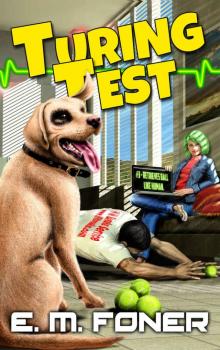- Home
- E. M. Foner
Vacation on Union Station (EarthCent Ambassador Book 7) Page 9
Vacation on Union Station (EarthCent Ambassador Book 7) Read online
Page 9
“Did it work?” Daniel asked.
“Who knows? My father wouldn’t let us buy the first batch of samples even though we had our own savings. He said if we wanted to sell cosmetics, we should contact a wholesaler, pick some stock, and he’d pay to give it a try. We still have twenty gross of fruit-flavored lip gloss in storage somewhere.”
“Both pitches are an example of multi-level marketing techniques that were common on Earth before the Stryx came,” Jeeves informed them. “Some of your regulators accused such businesses of being pyramid schemes, but of course, you could say the same about practically all human economic activities at the time. I don’t see any records of pyramid schemes being used in elections, but that’s probably due to government censorship.”
“He made that last part up,” Libby informed them over the office speakers. “Why don’t you play the next cube and find out?”
Walter shook his head and reached back into his carpetbag, muttering to himself as he searched for the second cube. When he pulled it out, he threw it against the wall with appreciably more force than was required.
“Welcome back to the HEEL course in multi-level organizing,” the beautiful instructor said.
Jeeves remained silent, but he looked as smug as a robot can look. This time the instructor was shown walking towards them through an outdoor market populated by cartoonish animations of shoppers and vendors.
“What’s with the mask?” Daniel asked. “Are they afraid that the evil EarthCent police are going to hunt her down?”
“Just watch how it works as I start to recruit downliners,” the instructor continued. “Let’s begin with him.”
A cartoon version of a man dressed in Victorian formalwear that would have looked at home in a period Sherlock Holmes immersive obligingly stopped for their instructor and waited to be sold on something.
“Good day, sir. Would you like to end taxation without representation?”
“With all of my heart,” the man replied.
“And do you believe in one man, one vote?”
“God save the King, I do,” came the strange response.
“Then go forth and tell others,” the instructor said. “You have but one life to give for your country.”
“Give me liberty or give me death!” the gentleman responded, as if they were exchanging code phrases. A white line popped into existence between the instructor and her convert to democracy.
As the humans sat gaping at the hologram, the action sped up by an order of magnitude, and the Victorian organizer buttonholed one shopper after another. The conversations were indecipherable because the audio was compressed into nothing more than brief squeaks, but in every instance the recruiter was apparently successful, and a blue line appeared tying him to each new recruit.
In the meantime, their instructor continued to spread the word, and the white lines showing first level downliners continued to multiply. The speed of the hologram picked up until everything was a blur, and then suddenly, all of the action stopped. In the center of the hologram stood their instructor, a mass of white lines linking her to a circle of her first-level recruits. Each of those individuals was linked by blue to a further group of converts, who were linked by red to yet a larger group, and some of those already had green lines out to another level.
The masked instructor gathered the white lines in her hands and pulled. All of the cartoon figures in the marketplace fell to their knees.
“I’m ready for the election,” she said cheerfully. “In the next cube, I’ll show you how to get your voters to the polls while discouraging other candidates from doing the same.” The hologram dissolved.
“I can’t…, I’m not…, I don’t know what to say,” Walter stuttered.
“I found the presentation refreshingly honest, though the animation was quite crude,” Jeeves observed.
“Shouldn’t you ping Kelly?” Shaina asked. “If HEEL has as many organizers in the field as we think they do, even if only a fraction of them are successful with this multi-level electioneering thing, it will cause EarthCent problems.”
“I hate to bother her on her first vacation since she came to Union Station,” Clive said. “Besides, the first thing she would do is ask me for more information, so let’s hold off until we get some details from our agents and cultural attachés.”
“Can I count on you to keep me in the loop, Walter?” Daniel asked. “I’d hate to see some of the human communities setting up their own governments for the first time falling on their knees to a HEEL organizer who’s learned how to pull the strings.”
“It’s all very confusing,” Walter said. “Let me sleep on it.”
“If you decide to quit, could you put in a good word for me with your boss?” Jeeves asked. “I’m a very effective public speaker.”
Nine
Paul leaned back against the partially disassembled Horten lifeboat he’d been fiddling with and pulled the heat tab actuator on his coffee. There were only a few small family traders parked in the camping and maintenance area of Mac’s Bones, and other than tool rentals and a request for help adjusting a fiddly Sharf drive later in the day, they weren’t making any demands on Paul’s time. The lifeboat was salvage and it would probably end up as scrap, but it was close enough to the small parade ground that Paul could eavesdrop on Thomas addressing the class of recruits without being obvious about it.
“I know that some of you have friends who already work for EarthCent Intelligence and they’ve probably told you about the training camp,” Thomas was saying. “That’s why we spent the first week running around the hold, doing jumping jacks and lunging at each other with rubber knives. Physical training and team building exercises are indeed important, but some of us feel that in the short time we have you, more emphasis should be given to the unique skills required by agents in the field.”
The line of recruits began to nudge each other and grin. EarthCent Intelligence attracted lots of middle-aged and bookish candidates, and while self-defense demonstrations were fun to watch, getting thrown to the floor by a fellow beginner was always risky. The highlight of training camp so far had been the artificial person’s demonstration of tossing playing cards into the air and then spearing them with thrown pencils, but that wasn’t the sort of skill you could hope to master in just a few weeks.
“Starting today, I’ll be assisted by Chance, our most experienced field agent. She should be here any minute, but she’s not exactly a morning artificial person.”
A thirty-something woman wearing a handkerchief tied over her straw-blond hair raised a hand.
“Yes, Gretchen,” Thomas said. “You don’t have to raise your hand.”
“What percentage of EarthCent agents are artificial people, sir?”
“I’m glad you asked that question. The total number of EarthCent agents is proprietary business information, so I can’t share the percentage until you complete training and officially join the firm. However, I don’t see the harm in telling you that Chance and I are the only artificial people currently working for EarthCent Intelligence.”
“What special skills will you teach us?” inquired a middle-age man, who as a recreational jogger, was somewhat disappointed to hear that physical training would be deemphasized. He had enjoyed leaving the younger men behind.
“Let me ask you something,” Thomas said in reply. “What skills do you think are vital for agents in the field?”
“Running?” the jogger suggested.
“Surveillance?” Gretchen offered.
“Spearing playing cards with pencils?” a young man said hopefully.
“Assassination techniques?”
Everybody turned to look at the fierce young woman who had cut the sleeves off of her T-shirt on the first day of training camp. Blythe warned Thomas that Judith had badly failed the InstaSitter personality test that was also used as a screen for EarthCent Intelligence recruits, although the cut-off score was set much lower for spies. But now that all of the cultural attaché a
nd information analyst positions were well-staffed, Clive insisted they loosen the standard even further to start accepting more aggressive candidates.
“Dancing,” Chance declared, breaking the silence and suppressing a yawn as she sauntered up to the group. “Sorry I’m late, but, no, I don’t really have an excuse.”
“Dancing it is,” Thomas said, ignoring the latter part of Chance’s statement. “We can’t compete with the advanced species in surveillance technology, especially since we’re using their own equipment. And while throwing pencils, running and assassination are all useful skills, they share in common the trait that they’re only needed if all else fails. I hope we aren’t training you for failure here. The primary mission of Earthcent Intelligence agents in the field is to gather information, both personally and through building networks of sources. And how do you think this is done?”
“Money?” the jogger suggested.
“Artificial intelligence,” Gretchen said.
“Blackmail?” Judith guessed.
“Socializing,” Chance said. “How are you going to sound out a prospect or ask questions if you don’t get them into a conversation?”
Still leaning against the lifeboat, Paul had given up any attempt to pretend that he was busy working. Since Chance had stopped by the previous night to ask for his help in setting up for a new training exercise, he’d been trying to figure out how she was going to lead into it. Somehow he doubted that the artificial people had run the idea past Joe and Woojin.
“But none of us are as beautiful as you, as either of you,” protested an attractive young woman with apparent self-esteem issues.
“What’s your name?” Chance asked.
“Bonnie-Sue.”
“That’s a great name,” Chance said. “If my name was Bonnie-Sue, I bet I could sign up twice as many informants.”
“You’re just saying that to make me feel better,” Bonnie-Sue protested, though she couldn’t stop herself from blushing.
“No, I’m saying it to show you how to pick up guys in bars,” Chance explained. “I’m always seeing sentients let the opportunity to connect with somebody slip by because they think you need to come up with the perfect line. Now I just gave you two.”
“Try them on me now,” Thomas suggested to Bonnie-Sue.
“Uh, hi. What’s your name?”
“I’m Thomas.”
“You’re really good-looking, Thomas,” Bonnie-Sue said, and then she turned bright red in embarrassment. “Wait, I messed that up. What was it I was supposed to say? Uh, can I buy you a drink?”
“You’re going too fast,” Chance told her. “When sentients give you their names, they’ve basically authorized you to start a conversation on the subject. I’ve been making a study of techniques for getting acquainted with strangers, and if you can get two responses out of the average target, you’ve gained their trust enough to start complaining about work or travel. Now watch us.”
Chance took a few steps in the direction of Paul, then turned around and walked towards Thomas as if she was seeing him for the first time.
“Hi. What’s your name?” she asked, offering him friendly smile number four from her catalog.
“I’m Thomas,” he replied, looking a bit wary.
“Thomas. That’s a great name. My little brother is a Thomas.”
“You have a little brother?” Thomas asked. “How come you never told me?”
Chanced made a circle by placing the tip of her middle finger behind the last joint on her thumb and then flicked Thomas on the forehead.
“Ouch!” he exclaimed, rubbing the spot. “What was that?”
“That was me showing the ladies how to deal with a wise-guy in a bar,” Chance told him. She turned back to the recruits. “Did everybody get that? Good. Before we pair up to practice meeting strangers, I need to make sure you’re all familiar with role-playing. Do you know what I mean by role-playing?”
“Acting?” the jogger guessed.
“What’s your name?” Chance asked him.
“Stephen.”
“Huh,” Chance grunted. Stephen’s face fell when his name failed to meet with the artificial person’s approval.
“You’re role-playing somebody. Right?” Gretchen asked.
“Exactly,” Chance replied with a dazzling smile. “That was me playing the part of the typical guy who asks my name and then gets tongue-tied. Now I’ll play the role of a deep space trader who has just returned to a Stryx station and has been drinking in a bar, and you try getting some useful information from me. Pretend we’ve already covered the names subject and we’ve both had a few drinks. No, wait a sec,” she said, fumbling around in her pocketbook for a tube of her favorite goth lipstick. She turned her back to them for a moment, and when she turned around again, she sported the steely if somewhat out of focus gaze of a tipsy deep space trader, and a drawn-on mustache.
“So, how about going back to my room, Gretch?” Chance asked in a low tone.
Gretchen giggled and looked around self-consciously at the other trainees. “Uh, sure, I guess.”
“No,” Chance said, reverting to her usual vocal register. “What do you think his mind is going to be on if you go back to his room? Besides, if you want a man to respect you, never go home with him right away.”
“I never would,” Gretchen said, blushing again. “I was role-playing.”
“Hmm, maybe I led you down the garden path there, but the point of this exercise was to get you to think about what sorts of questions to ask a stranger after you’ve gotten past the introduction. Anybody?”
“How is your ship armed?” Judith asked.
The artificial person with the mustache shook her head in disapproval. “Too fast.”
“Visit any interesting worlds lately?” Stephen tried.
“That’s better,” Chance said.
“So how should I have answered your invitation?” Gretchen asked.
“Here,” Chance said, throwing her the black lipstick. “You be me, I mean, him. Let’s take it from the top this time. Alright?”
Gretchen hastily drew an uneven mustache above her lip.
Chance sashayed over to the trainee, took back her lipstick, and said, “Hi. What’s your name?”
“Gretchen,” the trainee replied, though her voice cracked a little from trying to sound like a man.
“Gretchen. That’s a great name. I once had a crush on a guy named Gretchen.”
“Want to go back to my place?” Gretchen asked hopefully.
“I just got here,” Chance replied, brushing an imaginary speck of dust off of the recruit’s sleeve. “It sounds like you’ve been away from civilization for a while.”
“I get it,” Bonnie-Sue said excitedly. “If I was her, him, I’d start listing all the places I’d visited.”
“Giving him an excuse to talk about spending a long time on the road works on everybody except for a real lady’s man,” Chance told them. “Now I’m going to hand out some cards from a mercantile board game that Drazen children play, but don’t worry, I’ve written in the translations for each line. They basically provide your identity, starting with your species and ending with the most valuable item in your cargo.”
“So it’s role-playing,” Gretchen said.
“That’s right,” Thomas reentered the discussion. “It’s secret agent role-playing instead of soldier-in-boot-camp role-playing.”
“We’ve got some chairs set up in front of the ice harvester,” Chance continued. “We’re all going to go over there, pair off, and see how you do extracting information from each other. Everybody has to drink a couple of beers to keep it realistic, but try to stay in your role. And remember, it’s not a contest to see who can keep secrets. It’s an exercise to practice hearing what somebody is saying and guiding the conversation in the direction you want it to go.”
“I don’t drink beer in the morning,” one of the younger recruits said dubiously.
“Then it’s time you learned,” Ch
ance replied, ushering them towards the improvised beer garden.
“I don’t drink alcohol at all,” a middle-aged woman complained.
“Then it’s time you learned to fake it,” Chance said in exasperation. “Paul has volunteered to play bartender for us, so order a mixed drink without the alcohol and give him a good tip so he doesn’t blab. Thomas, help Paul bring up as many pitchers as you can manage, and I’ll get the trainees seated and hand out the Drazen cards.”
Paul and Thomas strode out ahead of the pack and entered the ice harvester at deck level, utilizing the side port that led directly into Joe’s brewing room.
“Did you know that this was what she was planning?” Paul asked.
“I thought we were going to focus on dancing today, but we talked about doing bar interrogations as well.”
“Maybe she looked over the recruits and decided they could use a few beers before hitting the dance floor,” Paul said. “I know I do.”
“I didn’t think of that,” Thomas replied, looking thoughtful. “How about we just bring out a keg, like you do for picnics?”
“Makes sense to me,” Paul concurred. “We’ll take the tapped one, but let’s try to avoid sloshing or I’ll get nothing but foam until it settles down.”
It took them a few minutes to move the keg around to the patio area at the front of the ice harvester where the folding tables and chairs were set up. Chance had finished pairing off all of the recruits and was making sure that everybody understood the roles they were to play.
“I need a different card,” a large man with the weather-beaten face and hands of an ex-ag world laborer declared.
“Even if it’s the exact opposite of who you are, it’s important to learn how to adapt,” Chance replied patiently.
“It’s not that,” the man said. “The card says I’m the dominant male in a Fillinduck trio, but I’ve never even heard of Fillinducks.”
“Sorry,” Chance said, exchanging cards with him. “Does anybody else have an identity they can’t work with?”
“I can manage a Horten I think, but I don’t understand what my cargo is,” another man complained.

 Last Night on Union Station (EarthCent Ambassador Book 16)
Last Night on Union Station (EarthCent Ambassador Book 16) Empire Night on Union Station (EarthCent Ambassador Book 18)
Empire Night on Union Station (EarthCent Ambassador Book 18) Space Living (EarthCent Universe Book 4)
Space Living (EarthCent Universe Book 4) Review Night on Union Station (EarthCent Ambassador Book 11)
Review Night on Union Station (EarthCent Ambassador Book 11) Assisted Living
Assisted Living Con Living
Con Living Freelance On The Galactic Tunnel Network
Freelance On The Galactic Tunnel Network Career Night on Union Station
Career Night on Union Station Career Night on Union Station (EarthCent Ambassador Book 15)
Career Night on Union Station (EarthCent Ambassador Book 15) Word Night on Union Station (EarthCent Ambassador Book 9)
Word Night on Union Station (EarthCent Ambassador Book 9) Soup Night on Union Station
Soup Night on Union Station Human Test
Human Test Spy Night on Union Station (EarthCent Ambassador Book 4)
Spy Night on Union Station (EarthCent Ambassador Book 4) Family Night on Union Station (EarthCent Ambassador Book 12)
Family Night on Union Station (EarthCent Ambassador Book 12) Party Night on Union Station (EarthCent Ambassador Book 10)
Party Night on Union Station (EarthCent Ambassador Book 10) Turing Test
Turing Test Alien Night on Union Station (EarthCent Ambassador Book 2)
Alien Night on Union Station (EarthCent Ambassador Book 2) Wanderers On Union Station (EarthCent Ambassador Book 6)
Wanderers On Union Station (EarthCent Ambassador Book 6) Vacation on Union Station (EarthCent Ambassador Book 7)
Vacation on Union Station (EarthCent Ambassador Book 7) Book Night on Union Station (EarthCent Ambassasor 13)
Book Night on Union Station (EarthCent Ambassasor 13) LARP Night on Union Station
LARP Night on Union Station Carnival On Union Station (EarthCent Ambassador Book 5)
Carnival On Union Station (EarthCent Ambassador Book 5) LARP Night on Union Station (EarthCent Ambassador Book 14)
LARP Night on Union Station (EarthCent Ambassador Book 14) Book Night on Union Station
Book Night on Union Station High Priest on Union Station (EarthCent Ambassador Book 3)
High Priest on Union Station (EarthCent Ambassador Book 3) Meghan's Dragon
Meghan's Dragon Human Test (AI Diaries Book 2)
Human Test (AI Diaries Book 2) Guest Night on Union Station
Guest Night on Union Station Date Night on Union Station
Date Night on Union Station